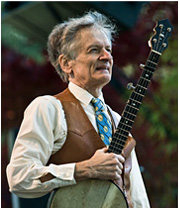
Mike Seeger
August 15, 1933 - August 7, 2009
Mike Seeger devoted his life to singing and playing what he often called "Music from True Vine" - the home music made by American southerners before the media age. As he described it: "Music from True Vine grows out of hundreds of years of British traditions that blended in our country with equally ancient African traditions to produce songs and sounds unique to the United States. For the peoples of the rural South, their great variety of music, song, and story provided their Shakespeare, their dance music, their news, and the fabric of their daily lives. This music in time became the roots of today's country, bluegrass, and popular music and remains as ever, enduring and refreshing listening."
Fidelity to traditional sounds set Mike apart from other performers as he began touring the United States and abroad in 1960. His music conveys all the depth of feeling, the sheer energy, and the infinite variety and texture of true traditional rural music. Like earlier traditional musicians, Mike sought out his own vision of the music by creating within its traditions, making his music uniquely his own.
As he sang the old songs, he played in a wide variety of traditional styles, accompanying himself on an array of instruments, including banjo, fiddle, guitar, trump (jaw harp), mouth harp (harmonica), quills, lap dulcimer, mandolin, and autoharp.
The Seegers sang with their children most Saturday nights. Mike learned the old ballad Barbara Allen at age five from the singing of his musicologist/composer parents. Soon he graduated to listening and learning from their collection of early documentary recordings. He began playing instruments in his late teens, learning first from nearby musicians such as his close friend Elizabeth Cotten, and later seeking out other master stylists like guitarist Maybelle Carter, banjoists Dock Boggs, Cousin Emmy, and autoharpist Kilby Snow. Eventually Mike's love for traditional music led him to produce documentaries - more than twenty five field recordings and videos - and to organize countless tours and concerts featuring traditional musicians and dancers.
As a founding member of the pioneering traditional music group, The New Lost City Ramblers, Mike played an integral role in helping to revive interest in a variety of traditional musics, now played by thousands of young musicians across the country. Following his first recordings with the Ramblers, in the late nineteen fifties, Mike went on to record more than forty albums, both solo and with others.
Mike received six Grammy nominations: two with the New Lost City Ramblers, one with John Hartford and David Grisman, and three on his own. In 1995 Mike received the Rex Foundation's Ralph J. Gleason Lifetime Achievement Award, established by the Grateful Dead, honoring him as "one of our great musical and cultural resources." In 2009 the National Endowment for the Arts awarded Mike the nation's highest honor in the field of traditional arts, a National Heritage Fellowship.
Mike continued to tour, teach, and record until the summer of 2009, when he was diagnosed with a fast-growing bone marrow cancer that resisted treatment. He died in peace on August 7 at his home in Rockbridge County, Virginia.